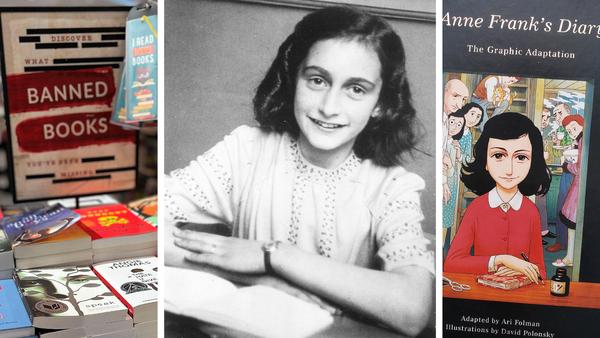2. oktober 2023
How did Anne Frank's Diary and a Nobel Prize winner end up among banned books in the USA?

Books have always sparked controversies. But now, it is not governments or the church that call for bans. Anyone can claim a similar authority — and have their will imposed.
By KJERSTI LØKEN STAVRUM, CEO Tinius Trust
Books have always sparked controversies. But now, it is not governments or the church that call for bans. Anyone can claim a similar authority — and have their will imposed.
"This illustrated and adapted edition is so engaging and effective that it's easy to imagine it replacing 'The Diary' in classrooms and among young readers," The New York Times wrote in its review of Ari Folman's illustrated version of "Anne Frank's Diary" upon its release in the American market four years ago. The reviewer highlighted the depiction of Anne Frank's humor.
The book is a visual adaptation of the world-renowned diary written by 14-year-old Anne Frank while her family was hiding from the Nazis in Amsterdam during World War II. In 1944, Anne Frank and her family were discovered, and she perished in Bergen-Belsen in 1945. The diary has played a crucial role in keeping the story of Anne and the plight of other Jews alive.
Brilliant Reviews
The illustrated book has garnered brilliant reviews and has been published in 20 languages. In our country, it was hailed as "a beautiful and colorful version." Notably, the edition has received enthusiastic support from the Anne Frank Foundation, which oversees her legacy.
Unexpectedly, there was news of a teacher in Texas who, last week, lost her job for reading aloud from this illustrated edition to an 8th-grade class. In our country, Dagbladet was the first to report on this incident. This news surfaced when I was to deliver a lecture at the House of Literature in Oslo as part of a series on the same topic: Banned Books.
Not 'Approved'
A spokesperson for the school district in Texas explained that the book was not approved and that an "active investigation" is now underway. In April, the same book was removed from a library in Florida. Among its contents, the book includes a scene where Anne Frank suggests to a friend that they show each other their breasts.
Books and school libraries have increasingly become battlegrounds for the USA's political engagement and power struggles.
Vocal activists and concerned parents consider it their responsibility to scrutinize the books available to children and teenagers. This responsibility is substantial.
If a book is challenged, it is often removed for further review. At times, this decision can be made by a simple majority in the school board.
As a result, books often become vulnerable.
Who is willing to take on the burden of endorsing a book's content and defending it against political and moral indignation, especially when the consequences include losing one's job?
Ironic Contradiction
Those interested in how many books are involved can refer to the list maintained by the free speech organization PEN America, which continuously tracks such incidents.
Even the books of Nobel laureate in literature, Toni Morrison, face the same fate. They are now displayed in American bookstores under the sign "Banned Books," an ironic contradiction.
Morrison was awarded the Nobel Prize in 1993 for bringing "life to an essential part of American reality," as the academy stated in its justification.
When Morrison passed away in 2019, former President Barack Obama was among those who paid tribute to her. He referred to the author as a national treasure. "Her writing was not just beautiful but meaningful—a challenge to our conscience and a call for greater empathy," he wrote on Facebook.
Direct and Unvarnished
Morrison aimed to convey the trauma of slavery in the USA – a violent part of American history. To do this, she used a direct and accurate approach. However, the very aspect that earned her the Nobel Prize is also what some people struggle with. It becomes too much for some.
Books have always sparked controversies, dating back to the time of Qin Shi Huang, the first emperor of a unified China (221 BC) and the founder of the Qin dynasty. Reportedly, he was the first to employ this method of censorship: Qin banned all books on history and classical Chinese literature that glorified previous rulers – because history was supposed to begin with him.
Unease Before Swedish Book Fair
Since then, history has been filled with examples of book censorship, some more significant than others, like Charles Darwin's book on the Origin of Species. But now, it is not governments or the church that call for bans. Anyone can claim a similar authority — and have their will imposed.
Books serve as both tangible challenges and symbolic objects for protest.
When the major book fair in Gothenburg was organized this autumn, it was accompanied by extensive security measures following months of Quran burnings. "If I were to plan an attack on Sweden, I would target the book fair. It's like our holy book, so to speak. I'm not usually scared, but this time I am uneasy. I've never felt this way before," says Swedish Åsa Linderborg in the latest episode of the podcast 'Norsken, Svensken og Dansken' ('The Norwegian, The Swede, and The Dane'). Concurrently, Swedish PEN initiated its campaign against the trend of banning books.
Not a Problem in Norway
In Norway, it has been almost 30 years since William Nygaard, then the publisher at Aschehoug, was shot for publishing Salman Rushdie's "The Satanic Verses." This was the most brutal single attack on freedom of speech in Norway during peacetime before the July 22nd terror attacks.
Nevertheless, the issue of banned books is not prevalent in Norway. The Norwegian Library Association mentioned an incident from 2019 when I inquired. In that instance, a Chinese ski team leader at a training camp in the area demanded the removal of certain books from the Meråker library, which the librarian denied.
However, this does not imply that we should be unprepared for such confrontations in the future. Such challenges will inevitably emerge. It is crucial to remain aware and transparent about the objectives and principles of the open, liberal spaces that libraries are intended to be. We must avoid complacency, as Sarah C.J. Willand and Tine Kjær highlighted in a recent Aftenposten article.
On a related note, it may be time to reconsider the ban on Christian Krohg's book "Albertine," which has been prohibited since 1888.
__
This Op-Ed was first published in Dagens Næringsliv on Saturday, September 29th, 2023.



